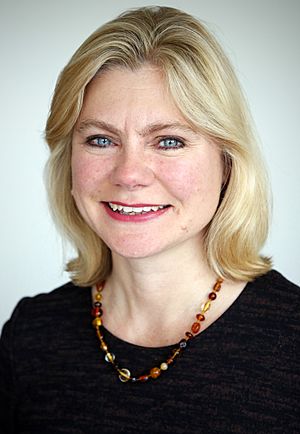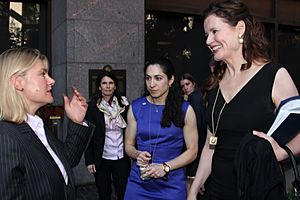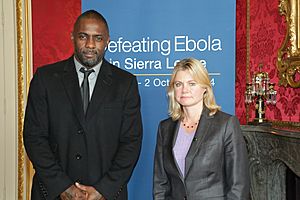Justine Greening facts for kids
Quick facts for kids
Justine Greening
|
|
|---|---|

Official portrait, 2017
|
|
| Secretary of State for Education | |
| In office 14 July 2016 – 8 January 2018 |
|
| Prime Minister | Theresa May |
| Preceded by | Nicky Morgan |
| Succeeded by | Damian Hinds |
| Minister for Women and Equalities | |
| In office 14 July 2016 – 8 January 2018 |
|
| Prime Minister | Theresa May |
| Preceded by | Nicky Morgan |
| Succeeded by | Amber Rudd |
| Secretary of State for International Development | |
| In office 4 September 2012 – 13 July 2016 |
|
| Prime Minister | David Cameron |
| Preceded by | Andrew Mitchell |
| Succeeded by | Priti Patel |
| Secretary of State for Transport | |
| In office 14 October 2011 – 4 September 2012 |
|
| Prime Minister | David Cameron |
| Preceded by | Philip Hammond |
| Succeeded by | Patrick McLoughlin |
| Economic Secretary to the Treasury | |
| In office 13 May 2010 – 14 October 2011 |
|
| Prime Minister | David Cameron |
| Preceded by | Ian Pearson |
| Succeeded by | Chloe Smith |
| Shadow Minister for London | |
| In office 19 January 2009 – 13 May 2010 |
|
| Leader | David Cameron |
| Preceded by | Bob Neill |
| Succeeded by | Tessa Jowell |
| Member of Parliament for Putney |
|
| In office 5 May 2005 – 6 November 2019 |
|
| Preceded by | Tony Colman |
| Succeeded by | Fleur Anderson |
| Personal details | |
| Born | 30 April 1969 Rotherham, West Riding of Yorkshire, England |
| Political party | Conservative |
| Education | Oakwood Comprehensive School |
| Alma mater | University of Southampton London Business School |
Justine Greening (born 30 April 1969) is a former British politician. She served as a Member of Parliament (MP) for Putney from 2005 to 2019. An MP is a person elected to represent their local area in the government.
As a member of the Conservative Party, she held several important government jobs. These included Secretary of State for Education, Secretary of State for Transport, and Secretary of State for International Development. A Secretary of State is a senior minister in charge of a government department.
In 2018, Greening left her role as Education Secretary. In 2019, she announced she would not run for MP again. She disagreed with her party's leader, Boris Johnson, on the issue of Brexit. Because of this, she and 20 other MPs were removed from the Conservative Party group in Parliament. She served as an independent MP until the next election.
Contents
Early Life and Education
Justine Greening was born in Rotherham, England. She went to Oakwood Comprehensive School. She later studied Business Economics and Accounting at the University of Southampton. She graduated with a first-class honours degree, which is the highest grade possible.
Before becoming a politician, Greening worked as an accountant. She used her skills in finance for large companies like PricewaterhouseCoopers, GlaxoSmithKline, and Centrica. In 2001, she tried to get elected in the Ealing, Acton and Shepherd's Bush area but was not successful.
Political Career
Becoming a Member of Parliament
In the 2005 general election, Greening won the election for the Putney area in London. She became the new MP for Putney, taking the seat from the Labour Party. Her victory was an early sign that the Conservative Party was gaining more support.
At the time, she was the youngest female Conservative MP in the House of Commons. She was soon given more responsibilities. In 2007, she became a Junior Shadow Minister for the Treasury. This means she was part of the opposition team that checks the government's financial plans.
Working in Government
When the Conservatives came to power in 2010, Greening became the Economic Secretary to the Treasury. In this role, she helped manage the country's finances.
Transport Secretary
In 2011, she was promoted to Secretary of State for Transport. One of her major tasks was dealing with plans for Heathrow Airport. Greening had long been against building a third runway at the airport.
She also managed the process of awarding contracts for train services. There was a problem with the process for the InterCity West Coast line. Greening cancelled the decision after flaws were found. An official report later said that government workers, not ministers, were responsible for the mistake.
International Development Secretary

In 2012, Greening became the Secretary of State for International Development. Her job was to manage the UK's aid to other countries. Under her leadership, the UK became the first major country to spend 0.7% of its national income on helping developing nations.
She led the UK's response to major natural disasters. This included Typhoon Haiyan in the Philippines in 2013 and the earthquake in Nepal in 2015. She also led the international response to the Ebola virus outbreak in Sierra Leone.
Greening was passionate about education and women's rights around the world. In 2014, she hosted the first-ever Girl Summit in London. This event aimed to end child marriage and other harmful practices affecting girls. She also helped create a United Nations group focused on improving economic opportunities for women.
Education Secretary
In 2016, Prime Minister Theresa May appointed Greening as Secretary of State for Education. She was also made the Minister for Women and Equalities.
In this role, she created "opportunity areas" across England. These were places that received extra funding to help young people get better education and job opportunities. She also supported creating new free schools and grammar schools.
Greening remained in her post after the 2017 election. However, she left the government in January 2018 during a cabinet reshuffle. A reshuffle is when the Prime Minister changes the roles of senior ministers.
Leaving Parliament
After returning to her role as a regular MP, Greening focused on social mobility. This means making sure everyone has a fair chance to succeed in life, no matter their background. She started the Social Mobility Pledge, a project for businesses to help create more opportunities.
She also became a strong supporter of having a second referendum on Brexit. She believed that Parliament could not agree on a plan, so the public should decide.
In September 2019, Greening voted against the government's Brexit plan. As a result, she and 20 other Conservative MPs were removed from the party's group in Parliament. They became independent MPs. Greening had already announced that she would not be standing for re-election.
Life After Politics
Since leaving Parliament, Justine Greening has continued to work on improving social mobility. She hosts a podcast called "Fit For Purpose," where she talks to businesses about how they can help create a fairer society.
In 2020, she worked with the University of Northampton on a campaign to help the country recover from the COVID-19 pandemic. In July 2023, she received an honorary doctorate from the University of Southampton, where she had studied. Since June 2024, she has served as the Chancellor of the university.
See also
 In Spanish: Justine Greening para niños
In Spanish: Justine Greening para niños
 | William M. Jackson |
 | Juan E. Gilbert |
 | Neil deGrasse Tyson |


